#Sahra Mellesse
Text
Bengiyo's Queer Cinema Syllabus
For those who are not aware, I have decided to run the gauntlet of @bengiyo’s Queer Cinema Syllabus and have officially started Unit 1: Coming of Age Post Moonlight.
The films in Unit 1 are: Pariah (2011), Get Real (1998), Edge of Seventeen (1998), My Own Private Idaho (1991), and Mysterious Skin (2004)
Today I will be writing about
Pariah (2011) dir. Dee Rees
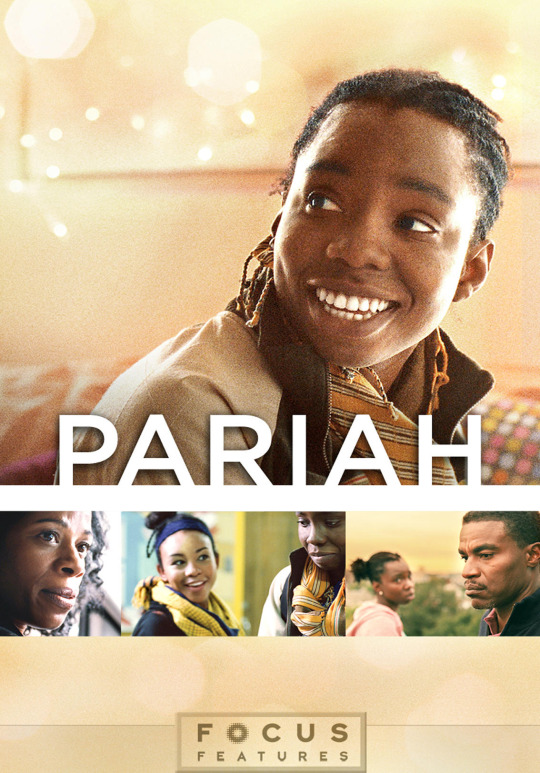
[Available on: Amazon, YouTube Rental, Run Time: 1:26]
Summary: A Brooklyn teenager juggles conflicting identities and risks friendship, heartbreak and family in a desperate search for sexual expression. (from IMDB)
Cast:
Adepero Oduye as Alike (pronounced Ah-Lee-Kay)
Aasha Davis as Bina, Alike's love interest
Charles Parnell as Arthur, Alike's father
Kim Wayans as Audrey, Alike's mother
Pernell Walker as Laura, Alike's best friend
Sahra Mellesse as Sharonda, Alike's younger sister
Overall Thoughts (this write up is longer than my The Birdcage one because this time I actually took notes)
I LOVED THIS FILM. I am so intrigued by the layers this film builds for itself. If there was one phrase that came to mind while I watched this film it would be “code-switching.” Not in the traditional way it would relate to language and linguistics, but in the way that there is code and there is switching. Because there are so many levels of change and obfuscation in this film from the clothing to the queer flagging to the thinly veiled threats. Before I get too far in to this, let’s do a quick analysis of the main character’s name
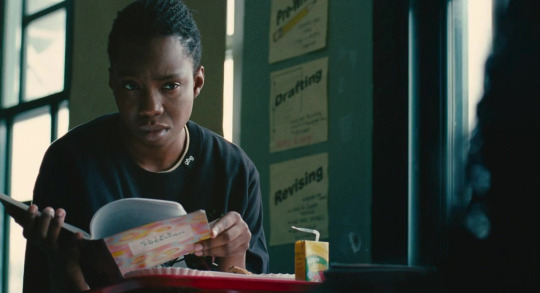
Alike Freeman.
Alike- Origin: Nigerian, Meaning: “girl who drives out beautiful women” (at least according to babycenter)
Freeman- I mean…I feel like this one is pretty self-explanatory. But it is very very intentional.
The film opens in a lesbian club, showing Alike wearing baggy, masculine clothing. On the bus ride home, she changes into a more femme style. And here we have the first switch. With her friend, out on the town, in the dark (look, Ben! I haven’t even seen this show yet, but I knew you were gonna pop in here with the link so I figured I would get ahead of it) Alike is free to be herself. To be openly, purposefully queer, to code herself that way. But the same cannot be said at home, where she is still in the (glass) closet. Second switch occurs when Alike leaves the house wearing more feminine clothing, and changes to more masculine clothing when she gets to school.
We see the first code soon after when Alike spends her lunch period in her English teacher’s classroom. (This is how you know the story was written by a lesbian). We see her full name for the first time written on the cover of her journal. Alike Freeman. What a wonderful name for someone who is not free to be herself in all parts of her life. The second code we see established around the dinner table and on the basketball court. The way this family interacts with each other, there is the push and pull between honesty and secrecy, control and lack of it, respect and disrespect, and the love you feel coming from these characters is palpable, but there is an undercurrent of understanding that this love may be conditional.
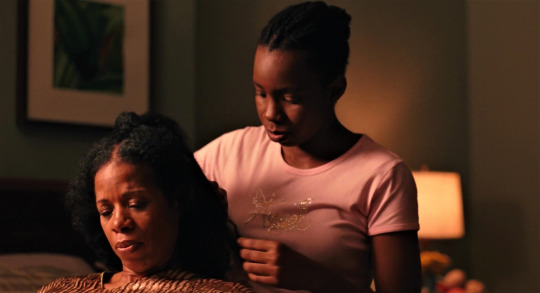
Audrey is interesting as a character because you know that she knows, and you know that she is trying to pretend like she doesn’t see it, and you know that she is (again, coding) trying to not-so-subtly “correct” her daughter’s behavior through the clothes that she buys her, through the disdain she has for Laura, by not letting Alike close the door when Laura is in her room, through telling Alike “God doesn’t make mistakes”. And the way that Audrey is lonely and isolated within the context of her family, within the social groups at work, because she is so internally focused on trying to stop her daughter from being gay that she has neglected every other connection in her life.
We get another semi-code with the conversation in the hallways between three girls, one of whom says: “Some of them AGs are cute, I’m not saying I would, but I’ll holla” \\ “I’m not gay, but if i was gay, I’d talk to [Alike]” \\ “I like girls, I love boys” while making occasional eye contact with Alike across the hallway or walking right past her. The girl is letting Alike know she’s interested while still trying to maintain both the illusion of straightness and disinterest.
Audrey connects Alike with the daughter of the literal only person she talks to in her office (read: her only trusted person) in the hopes that Alike will act more like a “lady”. While at first glance, we understand Audrey’s intention, we get yet another code from Bina that this plan may backfire for Audrey…when Bina mentions the English teacher. Queer. Coding.
I loved the way that everyone knew, everyone knows that Alike is queer, and they just. won’t. talk. about. it. I love the way this film shows the very hard lines of allyship (yet another switch). When a butch lesbian comes in to the barbershop and is being harassed by his friends, Arthur stays silent. When she leaves, Arthur gently calls out his friend. When Arthur’s friend calls Alike a “bull-dyke” he’s ready to throw hands. No one is willing to risk a fight with their friends when they are being shitty to a queer no one knows or cares about. Another code, this time from Arthur to Alike comes after his friend makes yet another homophobic, and vaguely threatening comment about his daughter while she is inside the store, when he says “you know you’re daddy’s girl, right?”. She is safe to be herself with him. His love for Alike is unconditional…unlike her mother’s.

I loved the way Alike’s caterpillar poem related to queerness, to closeted queerness in particular. The way the caterpillar felt trapped and suffocated in the dark cocoon, the way that Alike feels trapped and suffocated in the closet as she develops in to herself, as she develops in to her adulthood, as she develops in to her queerness.
I am obsessed with the way that Arthur codes his conversation with Alike as he attempts to coax her in to coming out to him when they are alone, at night, in the dark. I mean, just!! He starts to try to bring it up, bails, skirting the conversation to ask about school instead, Alike knows what’s up, and having complicated feelings around her first kiss, she starts asking her father for advice, keeping pronouns out of the conversation, slowly building to the moment where she is going to come out to him, and he knows it, and she knows it, and Arthur just…interrupts her to start asking questions about “him.” He adds he/him pronouns in to the conversation, and he walks away continues the conversation where Alike cannot see his face, and where he cannot see hers. Because he can’t handle that conversation, because he knows how deeply rooted Audrey’s homophobia is, because the second he hears her say that, he knows that he has lost his daughter. And so instead, he sends her vague and coded messages with his questions around the women’s club, and it being bad news, and to not be associated with it. Because again, if Alike comes out, he knows that he will lose her. So he steers the conversation the way it needs to go where he can equivocate to his wife, telling her that Alike told him she has a boyfriend (because she didn’t correct him when he started adding he/him pronouns to his questions about a crush).
I loved that Bina, a femme character was constantly the one initiating intimacy, while Alike, a masc character was constantly second guessing and then eventually bailing on initiating intimacy, and I loved that Bina is the one who decided she couldn’t handle admitting that she was queer while having sex for the first time helped Alike get over her hand ups. It felt subversive to me this way.

I LOVED LAURA. I think she 300% deserves better, but I loved that despite the fact she struggles, despite the fact that she was disowned, despite the fact that she acts tough (and is tough) she is so compassionate, so caring. She lets other homeless queers sleep in her sister’s apartment for the evening so they have a safe and secure roof over their head, she got her fucking GED, she reached out to her mother despite being the one abandoned by her, and she took Alike in after her mother beat her for being gay despite the fact that Alike kept blowing her off in order to follow her feelings for Bina. Laura is a community pillar and we love and support and cherish community pillars in the house.
I loved that while we get this initial eruption, and an acute burst of pain when Alike comes out, and her mother attacks her, the very next day Alike is in the light, watching the birds, being treated with softness and kindness, smiling and eating ice cream. I like that the loss of Alike’s presence in the family was palpable, that Audrey is clearing out the kitchen in the dark, that the Freeman’s are eating in the dark, and that Arthur reaches out to Alike in the light.

I loved that Alike makes it clear that she isn’t running. I like that I don’t feel like Alike is suffering here, the people who lose are her family, the person who loses the most is her mother. Alike still maintains a relationship with her father and her sister, and following in Laura’s footsteps, she tries to extend the olive branch to her mother. But her mother cannot do it. I love queer kids reaching out to their parents, and it is important to me to see that pain that comes from loving your parents unconditionally and finding they cannot do the same for you in return.
I don’t have anything I really want to say about the ending, because it was perfect and the script speaks for itself

“Your mother would always pick you up, your mother would always pick you up…you remember how we always used to race when it rang-” \\ “I got accepted in to an early college program…” \\ ‘I’m sorry I let her hurt you, you can always come back home. Things are gonna be different, I promise.” \\ “I’m not running, I’m choosing. I’m not going back home.” \\ “I know.” \\ “And you should tell Mom she was right, God doesn’t make mistakes.” \\ “You should tell her yourself.”
The way this moment punched me in the gut? Knowing that I was watching a father trying to bring his baby home and realizing that he is facing an adult who has been freed instead.
And on the subject of freedom, I am incredibly moved by the finally lines of the film:
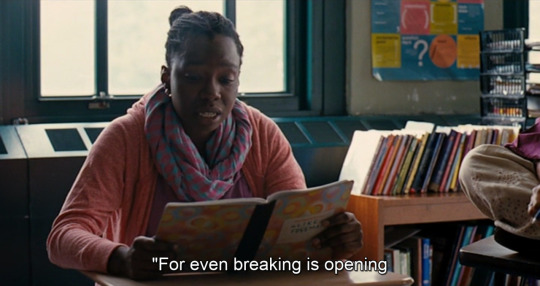
“For even breaking is opening. Broken to the new light without pushing in. Open to the possibility within pushing out. See the love shine in through my cracks. See the light shine out through me. I am broken. I am open. I am broken open. See the love light shining through me, shining through my cracks. Through the gaps. My spirit takes journey, my spirit takes flight. Could not have risen otherwise, and I am not running. I am choosing. Running is not a choice from a breaking. Breaking is freeing. Broken is freedom. I am not broken. I am free.”
Where Does This Film Fall in My By, For, About Queers Categorization?
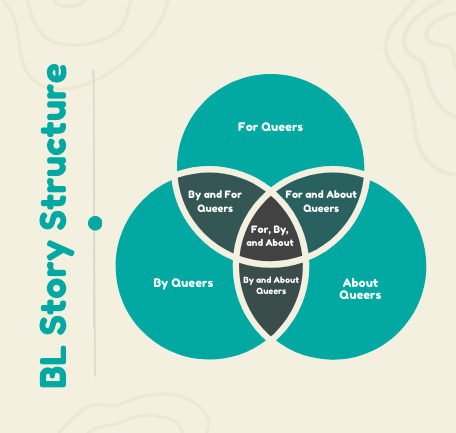
THE GAY TRIFECTA
The writer/driector, Diandria “Dee” Rees, is a lesbian and describes Pariah as “semi-autobiographical"
Favorite Moment
I wouldn’t say there was a particular moment that stood out above the others as my favorite, because it was all incredible, but I will say that my favorite visual element that was employed was the use of lighting. When Alike is in queer spaces, her world is awash in vibrant and varied colors. In the privacy of her room she is bathed in red light, when she is being comforted by Laura after the fight with her mother, she is bathed in blue.
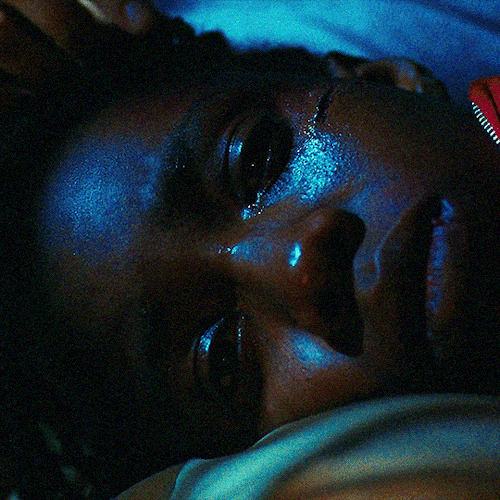
10/10 Film
41 notes
·
View notes
Text
Pride 2024 - Day 17

Movie: Pariah
Made in: 2011 – Set in: 2011
Starring: Adepero Oduye, Sahra Mellesse, Pernell Walker, Aasha Davis, Kim Wayans, Charles Parnell, Shamika Cotton
Rated R for: Language, sexual content, brief drug use and brief violence
Alike is a teenager who is forced to be someone she’s not by her mother and hides the fact she is a lesbian from her parents. When Alike’s mother presses her to befriend a colleague’s daughter, a friendship between them grows to a surprising outcome.
It’s a movie that shows being a teenager experiencing sexuality and wanting to find love, while also being afraid to get comfort or help form her parents. It shows what being a gay child to a religious parent can be like and how sometimes you just have to walk away from things that hurt you.
Spoilers under Keep Reading Line
No one dies in the movie, but Alike is physically attacked by her mother in one scene.
This movie shows what it’s like to be lesbian in an area that isn’t accepting of them. I liked Alike and how she wasn’t just a push-over and only gave in when it seemed nothing else would work. I felt sorry for her with how controlling her mother was and could understand why she’d keep so many secrets from her mom. Alike’s friend, Laura, wasn’t welcome with her own mother or Alike’s and I feel like that is because she’s a lesbian. Which would be another reason of hesitation from Alike. I felt sorry for the both of them and could understand the choices they made. I feel like Laura might have been in love with Alike? She didn’t really act like it as she tried to get Alike a girlfriend, but at times seemed almost jealous when Alike actually liked a girl. Alike’s mother was very hard to like at times as she forced Alike to be someone else and do things she clearly didn’t want to do. Though sometimes I wonder how much of her controlling nature was from her crumbling marriage and a need for control in her life. The movie hits you in the gut when Alike tells her mother she loves her and doesn’t get it said back. Parents should be accepting of their children and love them and it made me feel for Alike that she didn’t get that from her mother.
Mom’s Thoughts: This movie has been called by some reviewers “the female Moonlight.” I think this film had much deeper character development than Moonlight, possibly because it didn’t try to cover as great a time span as Moonlight and showed more of the character making choices rather than just taking what life threw at her. It is a coming-of-age, family drama story, very thought provoking and gives the audience an idea of what it is like for a young lesbian to explore her identity and her place in her family and community. I liked the fact that Alike (pronounced Ah-LEE-kay), or Lee, has her friend Laura whom she can confide in and get guidance from since her mom isn’t someone she can get unconditional love from. I felt sympathy for both Laura and Alike because neither had a mother who accepted them for who they are or loved them unconditionally. As a mother I could never shut out my child, no matter what. At the end Lee leaves home to stay with Laura after her mother attacks her. Her father goes to see her and she tells him she isn’t going back home. She’s been accepted into a school program that will help her attain her personal dreams. He thinks she’s running away. She tells him she’s not running away, she’s choosing. I liked that she had agency, made choices for herself and stood up to her mother, something I thought Chiron lacked in Moonlight. Also, I liked that her father seemed to accept her for who she was, not what he wanted her to be. I would watch this film again, perhaps to be able to pick up more of the story that I missed the first time through.
0 notes
Photo



Pariah (2011)
dir. Dee Rees
14 notes
·
View notes
Video
youtube
Pariah (2011)
directed by Dee Rees
A Brooklyn teenager juggles conflicting identities and risks friendship, heartbreak, and family in a desperate search for sexual expression.
#pariah#dee rees#movie#sapphic#sapphic art#sapphics in art#sapphic movie#wlw#wlw art#wlw movie#Adepero Oduye#Pernell Walker#Aasha Davis#Charles Parnell#Sahra Mellesse#movies
34 notes
·
View notes
Photo










Pariah (2011)
Director - Dee Rees, Cinematography - Bradford Young
“Heartbreak opens onto the sunrise for even breaking is opening and I am broken, I am open. Broken into the new life without pushing in, open to the possibilities within, pushing out. See the love shine in through my cracks? See the light shine out through me? I am broken, I am open, I am broken open. See the love light shining through me, shining through my cracks, through the gaps. My spirit takes journey, my spirit takes flight, could not have risen otherwise and I am not running, I am choosing. Running is not a choice from the breaking. Breaking is freeing, broken is freedom. I am not broken, I am free.“
#scenesandscreens#dee rees#adepero oduye#kim wayans#aasha davis#bradford young#charles parnell#pernell walker#sahra mellesse#Pariah
18 notes
·
View notes
Photo



1 note
·
View note
Text
The (Incomplete) List of Queer Movies With Actual Happy Endings
Disclaimer- I am a white lesbian, so while I have seen and enjoyed all of these movies, I do not have capital knowledge on what is and isn’t problematic or inaccurate
Gods Own Country (mlm)
A young farmer numbs his frustrations with drinking and casual sex until a Romanian migrant worker sets him on a new path.
Laurence Anyways (trans mtf, wlw)
In the '90s, Laurence tells his girlfriend, Fred, that he wants to become a woman; they confront the prejudices of their friends, ignore the council of their families and brave the phobias of the society they offend.
Were The World Mine (mlm)
A gay teen (Tanner Cohen) uses a love potion to turn close-minded townspeople into homosexuals, including the handsome jock with whom he is secretly in love.
The Birdcage (mlm)
In this remake of the classic French farce "La Cage aux Folles," engaged couple Val Goldman (Dan Futterman) and Barbara Keeley (Calista Flockhart) shakily introduce their future in-laws. Val's father, Armand (Robin Williams), a gay Miami drag club owner, pretends to be straight and attempts to hide his relationship with Albert (Nathan Lane), his life partner and the club's flamboyant star attraction, so as to please Barbara's father, controversial Republican Sen. Kevin Keeley (Gene Hackman).
Kiss Me (wlw)
A young woman engaged to be married finds herself in an affair with her soon-to-be stepmother's lesbian daughter.
Handsome Devil (mlm)
Two opposites, a loner and the top athlete become friends at a rugby-obsessed boarding school, and the authorities test their friendship.
Pride (mixed)
Realising that they share common foes in Margaret Thatcher, the police and the conservative press, London-based gay and lesbian activists lend their support to striking miners in 1984 Wales.
Boy Meets Girl (trans mtf)
Ricky, a 21-year-old transgender young woman living in Virginia, dreams of becoming a designer in New York.
Moonlight (mlm, poc)
A look at three defining chapters in the life of Chiron, a young black man growing up in Miami. His epic journey to manhood is guided by the kindness, support and love of the community that helps raise him.
The Handmaiden (wlw, poc)
With help from an orphaned pickpocket (Kim Tae-ri), a Korean con man (Ha Jung-woo) devises an elaborate plot to seduce and bilk a Japanese woman (Kim Min-hee) out of her inheritance.
North Sea Texas (mlm)
A teenager searching for love finds it in the boy next door.
To Wong Foo, Thanks for Everything! Julie Newmar (poc)
Three drag queens travel cross-country until their car breaks down, leaving them stranded in a small town.
Saving Face (wlw, poc)
Wil (Michelle Krusiec) is a lesbian, but she not dare tell her widowed mother, Hwei-lan (Joan Chen), or her very traditional grandparents. She's shocked, however, to find out she's not the only one in her family with romantic secrets when she learns that her 48-year-old mother is pregnant. Unwilling to reveal who the father is, Hwei-lan is kicked out of her parents' home and must move in with Wil, which puts a strain on Wil's budding relationship with openly gay Vivian (Lynn Chen).
4th Man Out (mlm)
After celebrating his 24th birthday, a mechanic (Evan Todd) decides to tell his three buddies (Parker Young, Chord Overstreet) that he is gay.
The Danish Girl (trans mtf, wlw)
With support from his loving wife Gerda (Alicia Vikander), artist Einar Wegener (Eddie Redmayne) prepares to undergo one of the first sex-change operations.
The Adventures of Priscilla Queen of the Desert (trans mtf)
When drag queen Anthony (Hugo Weaving) agrees to take his act on the road, he invites fellow cross-dresser Adam (Guy Pearce) and transsexual Bernadette (Terence Stamp) to come along. In their colorful bus, named Priscilla, the three performers travel across the Australian desert performing for enthusiastic crowds and homophobic locals. But when the other two performers learn the truth about why Anthony took the job, it threatens their act and their friendship.
Romeos (trans ftm, mlm)
Lucas, a transgendered woman becoming a man, is stuck in a female residential hall.
52 Tuesdays (trans ftm)
A teenage girl's road to adulthood and independence is accelerated when her mum says he wants to become a man, and limits their time together to Tuesday afternoons.
Esteros (mlm, poc)
Matias and Jeronimo's friendship takes a new turn during the holiday before starting high school, when they both experience their sexual awakening.
The Half of It (wlw, poc)
A shy, introverted student helps the school jock woo a girl whom, secretly, they both want.
Pariah (wlw, poc)
Teenage Alike (Adepero Oduye) lives in Brooklyn's Fort Greene neighborhood with her parents (Charles Parnell, Kim Wayans) and younger sister (Sahra Mellesse). A lesbian, Alike quietly embraces her identity and is looking for her first lover, but she wonders how much she can truly confide in her family, especially with her parents' marriage already strained. When Alike's mother presses her to befriend a colleague's daughter (Aasha Davis), Alike finds the gal to be a pleasant companion.
Big Eden (mlm)
Henry Hart (Arye Gross) is a young gay artist living in New York City. When his grandfather has a stroke, Henry puts his career on hold and returns home to the small town of Big Eden, Montana, to care for him. While there, Henry hopes to strike up a romance with Dean Stewart (Tim DeKay), his high-school best friend for whom he still has feelings. But he's surprised when he finds that Pike (Eric Schweig), a quiet Native American who owns the local general store, may have a crush on him.
1K notes
·
View notes
Text
“Watermelon Woman”
1997, Cheryl Dunye
youtube
“An aspiring black lesbian filmmaker (Cheryl Dunye) researches an obscure 1940s black actress billed as the Watermelon Woman.”
Currently *free* to stream w/o subscription via Criterion Channel / stream on Amazon Prime, Fandor, Kanopy, Criterion Channel, Epix
“Looking for Langston”
1989, Isaac Julien
youtube
“Fantastical reflection on the story of African-American writer and poet Langston Hughes and the 1920s Harlem Renaissance, with archival footage alongside dream-like reconstructions.”
Visit https://www.isaacjulien.com/projects/looking-for-langston/ for more info on the film (recommended) / view clips on Vimeo
“Pariah”
2011, Dee Rees
youtube
“Teenage Alike (Adepero Oduye) lives in Brooklyn's Fort Greene neighborhood with her parents (Charles Parnell, Kim Wayans) and younger sister (Sahra Mellesse). A lesbian, Alike quietly embraces her identity and is looking for her first lover, but she wonders how much she can truly confide in her family, especially with her parents' marriage already strained. When Alike's mother presses her to befriend a colleague's daughter (Aasha Davis), Alike finds the gal to be a pleasant companion.”
Rent on Amazon/iTunes/Vudu/YouTube
“I Am Not Your Negro”
2016, Raoul Peck
youtube
“In 1979, James Baldwin wrote a letter to his literary agent describing his next project, "Remember This House." The book was to be a revolutionary, personal account of the lives and assassinations of three of his close friends: Medgar Evers, Malcolm X and Martin Luther King, Jr. At the time of Baldwin's death in 1987, he left behind only 30 completed pages of this manuscript. Filmmaker Raoul Peck envisions the book James Baldwin never finished.”
Stream on Amazon Prime / Rent on most platforms
“Moonlight”
2016, Barry Jenkins
youtube
“A look at three defining chapters in the life of Chiron, a young black man growing up in Miami. His epic journey to manhood is guided by the kindness, support and love of the community that helps raise him.”
Stream on Netflix
“Tongue Untied”
1989, Marlon Riggs
youtube
“Filmmaker Marlon Riggs gives a voice to communities of gay black men, presenting their cultures and perspectives on the world as they confront racism, homophobia and marginalization.”
Stream on Kanopy / Rent on Vimeo / Check local PBS stations for screenings
“Blind Faith”
1998, Ernest Dickerson
youtube
“John Williams (Courtney B. Vance) is an African-American attorney remembering one of his earliest and most personal cases -- in 1957, his own teenage nephew, Charlie (Garland Whitt), was charged with the murder of a white student. Charlie admits he committed the crime, but John believes the police bullied him into confessing. Charlie insists he is guilty, and the outraged public is more than ready to see the boy punished. Still, John believes Charlie is innocent and defends him in court.”
Stream on YouTube
“Brother to Brother”
2004, Rodney Evans
youtube
“Perry (Anthony Mackie) is a would-be painter struggling to find his voice as an artist and his identity as a black gay man. When his disapproving father kicks him out, he winds up in a homeless shelter where he meets a sympathetic gay poet named Bruce (Roger Robinson). As they get to know each other, Perry learns that Bruce was at the center of the 1920s and '30s Harlem Renaissance and faced many of the same prejudices and challenges in his day that Perry faces now.”
Stream on Urban Movie Channel, rent on most platforms
“Naz & Maalick”
2015, Jay Dockendorf
youtube
“Two closeted Muslim teens living in Brooklyn struggle to come clean about their sexuality.”
Stream on Hulu / rent on most platforms
“Born in Flames”
1983, Lizzie Borden
youtube
“When Adelaide Norris, the black radical founder of the Woman’s Army, is mysteriously killed, a diverse coalition of women – across all lines of race, class, and sexual preference – emerges to blow the System apart.”
Rent on Vimeo (recommended) or Amazon Prime
“Brother Outsider”
2003, Bennett Singer & Nancy Kates
youtube
“Despite his achievements in the Civil Rights Movement, Bayard Rustin was silenced and imprisoned due to being an openly gay man in a homophobic era.”
Stream on Kanopy and Sundance Now / check local PBS stations for screenings
“Check It”
2016, Dana Flor & Toby Oppenheimer
youtube
“Gay and trans teens in Washington, D.C., form a gang to protect each other.”
Rent on Vimeo and most platforms
“Paris is Burning”
1990, Jennie Livingston
youtube
“This documentary focuses on drag queens living in New York City and their "house" culture, which provides a sense of community and support for the flamboyant and often socially shunned performers. Groups from each house compete in elaborate balls that take cues from the world of fashion. Also touching on issues of racism and poverty, the film features interviews with a number of renowned drag queens, including Willi Ninja, Pepper LaBeija and Dorian Corey.”
Stream on Netflix
“The Aggressives”
2005, Daniel Peddle
youtube
“This documentary follows a group of women who are "aggressives," a subculture of lesbians who dress like men and even pass for them in society. These women hide female elements of their bodies and often adopt male personas. However, each of the women defines and utilizes the term "aggressive" slightly differently. They also struggle with the limitations of adhering too closely to the label. A number of the women choose to take part in drag parties and contests.”
Rent on Vimeo and other major platforms / Stream on Kanopy
“Tangerine”
2015, Sean Baker
youtube
“After hearing that her boyfriend/pimp cheated on her while she was in jail, a hooker and her best friend set out to find him and teach him and his new lover a lesson.”
Stream on Hulu
“Portrait of Jason”
1967, Shirley Clarke
youtube
“A black male prostitute and aspiring entertainer recounts his life story for filmmaker Shirley Clarke.”
Rent on Vimeo (recommended) or Amazon Prime
“Kiki”
2016, Sara Jordeno
youtube
“In New York City, LGBTQ youth-of-color gather on the Christopher Street Pier to practice the performance-based art form Ballroom, which was made famous in the early 1990s by Madonna's music video ‘Vogue’ and the documentary ‘Paris Is Burning.’”
Stream on Hulu / rent on most platforms
0 notes
Photo

Pariah (2011) Teenage Alike (Adepero Oduye) lives in Brooklyn's Fort Greene neighborhood with her parents (Charles Parnell, Kim Wayans) and younger sister (Sahra Mellesse). A lesbian, Alike quietly embraces her identity and is looking for her first lover, but she wonders how much she can truly confide in her family, especially with her parents' marriage already strained. When Alike's mother presses her to befriend a colleague's daughter (Aasha Davis), Alike finds the gal to be a pleasant companion. #priah #lgbtqi #lgbt #lgbtq #lgbtcinema #lgbtfilm #lgbtqicinema #lgbtqifilm #queer #queercinema #queerarts #lgbtarts #lgbtqiplus #instagood #gay #lesbian #nonbinary #genderqueer #queerdirect #picoftheday #dvd #film #instagay
1 note
·
View note
Photo
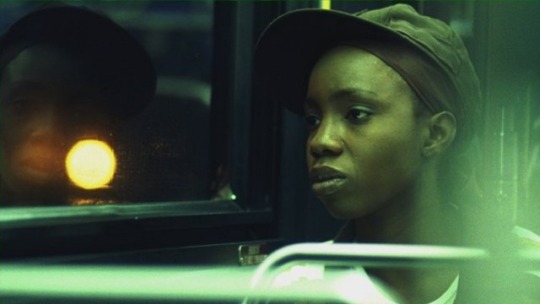


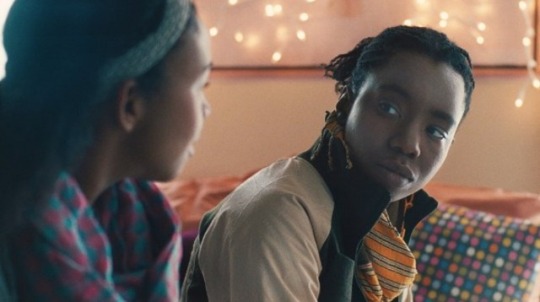
Pariah (2011) dir. Dee Rees
“I’m Not Running, I’m Choosing”: ‘Pariah’ and Gender Performance
“Who do you become if you can’t be yourself?” Pariah, my absolute favorite film of 2011, tackles that question.
Written and directed by Dee Rees and produced by Nekisa Cooper, the powerful, award-winning Pariah tells the story of Alike (Adepero Oduye in an astounding performance), a 17-year-old black lesbian in Brooklyn. Studious, artistic and sensitive, Alike is a writer who knows who she is but hides her sexuality from her family. We so rarely see positive portrayals of black women and queer women on-screen. Here, we have the privilege to see both. With subtlety and grace, it’s an exquisite and achingly beautiful female-centric coming-of-age film about a young woman discovering her sexuality and asserting her identity.
Carrie Nelson already wrote an articulate and intelligent review of the award-winning film. You should seriously go read it! But I want to touch on a few points that particularly struck me while watching, particularly about gender performance and identity. Most films don’t address teenage sexuality. Sure they may objectify women or poke fun at raging hormones. But they don’t often explore how teens’ discover their sexuality, especially women’s sexuality, people of color’s sexuality, or queer sexuality.
Throughout the film, we receive visual cues to Alike’s gender performance. When we first see Alike in a club, she’s wearing a loose men’s jersey, baggy jeans, and a baseball cap. She’s emulating her butch best friend Laura (Pernell Walker). On the bus home, Alike removes her hat and shirt, revealing a form-fitting top. She puts on earrings. All for her overprotective, lonely and overbearing mother Audrey (Kim Wayans). When she’s around her mom, Alike wears stereotypically feminine clothing. Flouncy skirts, dresses, snug blouses – all clothing that “shows off her figure” like her mother wants. form-fitting tops. Her mother buys her these clothes, knowing full well that Alike abhors wearing them. Yet refusing to accept her daughter, trying to orchestrate her daughter’s identity.
Alike’s mother can’t handle the fact that her daughter is a lesbian. Audrey shows a colleague at lunch a fuchsia sweater she bought for Alike. She tells Arthur (Charles Parnell), Alike’s father, that she’s “tired of this tomboy thing she’s doing.” Yet Alike tries to express herself, telling her parents that the sweater “isn’t me.” Alike’s identity contradicts her vision of her daughter that she imposed on Alike. Alike’s father is more protective of her as she’s a “daddy’s girl.” Yet he refuses to admit or see the signs that Alike might be a lesbian. Between the two is Alike’s sister Sharonda (Sahra Mellesse) who knows about her sexuality and loves her regardless.
Whenever Alike leaves home, she transforms herself into the identity she chooses. At school, we see her rush to the girls’ bathroom to change. She adopts a more masculine appearance to coincide with her gender non-conformity. Laura buys Alike a strap-on to have sex with a woman. But Alike’s uncomfortable wearing it (it’s white, it pinches her) and ends up throwing it away.
For Alike, both sets of clothing – the hyper-masculine and hyper-feminine – are a costume. She rebels from the princess wardrobe her mother wants for her by going to the other extreme, exploring if it’s who she is. But neither appearance encapsulates Alike. Both the butch and the femme identities are disconnected from her personality.
In an interview, Rees, an out lesbian herself, said Pariah is about identity and finding your place in the world:
“Alike’s a woman who knows she loves women and is sure in that, but her struggle is how to be. Her struggle is a more nuanced struggle of gender identity within the queer community. She’s not the same person that (her friend) Laura is, neither is she this pink princess that her mother wants her to be. She falls somewhere in between. Finding the courage to carve out that space is her journey.”
Audrey suspects her daughter is a lesbian or at the very least is attracted to women. But she tries to derail Alike’s sexuality. Audrey forces Alike and the charismatic Bina (Aasha Davis), the daughter of a work colleague and one of Alike’s classmates, to spend time together in a vain attempt to separate Alike from hanging out with Laura, whose own mother has disowned her for being a lesbian. Alike tells her mother that nothing is going to change, Audrey replies, “God doesn’t make mistakes,” as if homosexuality is a mistake. But Audrey’s plan backfires as Alike and Bina bond over music and share a growing attraction to one another.
Drawn to one another, Alike and Bina have sex. Despite their shared intimacy, Bina rejects Alike. Breaking Alike’s heart and devastating her, Bina tells her she’s not “gay-gay” and asks her to keep their encounter secret. We see that Bina possesses sexual fluidity yet is afraid to commit to a woman, perhaps due to society’s heteronormative standards. Or maybe she doesn’t want to commit to anyone, male or female. Or maybe she’s an insensitive asshole.
Whatever Bina’s motivations, Alike’s heartbreak ushers in her refusal to bury her identity any longer. Amidst a huge fight between her parents, Audrey angrily tells Arthur, “Your daughter is turning into a damn man right before your eyes.” Alike tells her parents she’s a lesbian, which enrages her mother. Audrey hits her repeatedly, her father trying to restrain her, after Alike finally confirms what her mother already knew.
Alike turns to Laura (who tries again to reach out to her mother after she earns her GED) for solace and support. Both women are able to commiserate as friends and as lesbians rejected by their mothers’ gendered expectations.
By the end of the film, we see Alike’s clothing change again. Adopting some of Bina’s style fused with her own – perhaps to convey that she’s learned from her heartache or it may be her acknowledgment of her sexual transformation – she wears scarves and earrings with jeans. No longer shadowing Laura and no longer conforming to her mother’s gender binary, Alike rejects the gender binary of butch and femme, a symbolic balance of her identity, a unison of femininity and masculinity.
Alike divulges her feelings through spoken word. Her poem at the end of Pariah is hauntingly stunning (making me weep uncontrollably), echoing her painful yet ultimately freeing journey towards self-acceptance:
“Heartbreak opens onto the sunrise for even breaking is opening and I am broken, I am open. Broken into the new life without pushing in, open to the possibilities within, pushing out. See the love shine in through my cracks? See the light shine out through me? I am broken, I am open, I am broken open. See the love light shining through me, shining through my cracks, through the gaps. My spirit takes journey, my spirit takes flight, could not have risen otherwise and I am not running, I am choosing. Running is not a choice from the breaking. Breaking is freeing, broken is freedom. I am not broken, I am free.”
Pariah shattered my heart with its aching beauty, uplifting my soul. We are allowed a window to witness her journey and self-discovery. Through her wardrobe and poetry, Alike eventually expresses herself as a lesbian in the way that she wishes. Alike insists she’s not running, she’s choosing. While she means this literally, there’s meaning beneath the surface. No longer running from who she is, Alike chooses to embrace her identity. Watching Alike discover and assert herself is beauty, poetry in motion.
http://www.btchflcks.com/2012/06/lgbtqi-week-im-not-running-im-choosing-pariah-and-gender-performance.html#.XKJ2c-tKiu4
1 note
·
View note